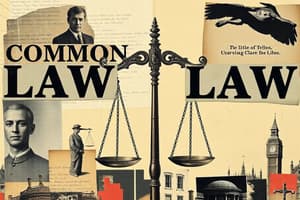Podcast
Questions and Answers
What differentiates law from social norms?
What differentiates law from social norms?
- Law is enforceable by the state. (correct)
- Law results in social disapproval.
- Law allows for personal interpretation.
- Law can be easily changed.
Which function does law NOT serve?
Which function does law NOT serve?
- Maintaining public order.
- Protecting individual rights.
- Regulating behavior.
- Encouraging social disobedience. (correct)
In which legal tradition does the judge primarily apply codified laws?
In which legal tradition does the judge primarily apply codified laws?
- Statutory law
- Mixed law
- Civil law (correct)
- Common law
What is a key characteristic of common law?
What is a key characteristic of common law?
What conflict may arise within the functions of law?
What conflict may arise within the functions of law?
What role does a judge primarily play in a civil law system regarding workplace safety?
What role does a judge primarily play in a civil law system regarding workplace safety?
In a common law system, how does a judge arrive at a ruling for workplace injury cases?
In a common law system, how does a judge arrive at a ruling for workplace injury cases?
What is usually the outcome when an employer is found non-compliant with labor codes in a civil law system?
What is usually the outcome when an employer is found non-compliant with labor codes in a civil law system?
What might result from a unique case ruling in a common law system?
What might result from a unique case ruling in a common law system?
What is a fundamental difference in how judges operate between civil law and common law systems?
What is a fundamental difference in how judges operate between civil law and common law systems?
What best defines the legal method?
What best defines the legal method?
Why is legal reasoning necessary for lawyers?
Why is legal reasoning necessary for lawyers?
What is meant by judicial precedent?
What is meant by judicial precedent?
What is a challenge that arises from ambiguous language in statutes?
What is a challenge that arises from ambiguous language in statutes?
Which aspect of legal reasoning is crucial for applying judicial precedent in current cases?
Which aspect of legal reasoning is crucial for applying judicial precedent in current cases?
What best characterizes the difference in lawmaking between civil law and common law systems?
What best characterizes the difference in lawmaking between civil law and common law systems?
In terms of civil law, which of the following areas primarily deals with disputes related to agreements between parties?
In terms of civil law, which of the following areas primarily deals with disputes related to agreements between parties?
Which statement accurately describes the role of judges in common law systems?
Which statement accurately describes the role of judges in common law systems?
What is a significant characteristic of the adversarial legal system compared to the inquisitorial system?
What is a significant characteristic of the adversarial legal system compared to the inquisitorial system?
Which of the following best contrasts public law and private law?
Which of the following best contrasts public law and private law?
What type of law is created through decisions made by judges in specific cases?
What type of law is created through decisions made by judges in specific cases?
Which chamber of the UK Parliament consists of appointed and hereditary members?
Which chamber of the UK Parliament consists of appointed and hereditary members?
What is the primary legislation that takes precedence over common law?
What is the primary legislation that takes precedence over common law?
What is the legal authority that emanates from the European Court of Human Rights and was incorporated into UK law through the Human Rights Act 1998?
What is the legal authority that emanates from the European Court of Human Rights and was incorporated into UK law through the Human Rights Act 1998?
Which of the following best describes secondary legislation?
Which of the following best describes secondary legislation?
Flashcards
Law vs. Social Norms
Law vs. Social Norms
Laws are rules enforced by the state, while social norms are rules that lead to social disapproval.
Law's Social Functions
Law's Social Functions
Law maintains order, controls behavior, and protects rights both on a large and small scale.
Common Law
Common Law
A legal system based on precedent (past rulings), where judges create and interpret the law.
Civil Law
Civil Law
Signup and view all the flashcards
Mixed Legal Systems
Mixed Legal Systems
Signup and view all the flashcards
Codified Law System
Codified Law System
Signup and view all the flashcards
Common Law System
Common Law System
Signup and view all the flashcards
Judge's Role in Codified Law
Judge's Role in Codified Law
Signup and view all the flashcards
Judge's Role in Common Law
Judge's Role in Common Law
Signup and view all the flashcards
Legal Outcome in Codified Law
Legal Outcome in Codified Law
Signup and view all the flashcards
Legal Method
Legal Method
Signup and view all the flashcards
Ambiguous Language in Law
Ambiguous Language in Law
Signup and view all the flashcards
Statutory Interpretation
Statutory Interpretation
Signup and view all the flashcards
Judicial Precedent
Judicial Precedent
Signup and view all the flashcards
Applying Precedent
Applying Precedent
Signup and view all the flashcards
Public Law vs. Private Law
Public Law vs. Private Law
Signup and view all the flashcards
Civil Law vs. Criminal Law
Civil Law vs. Criminal Law
Signup and view all the flashcards
Adversarial vs. Inquisitorial Systems
Adversarial vs. Inquisitorial Systems
Signup and view all the flashcards
Legal Reasoning
Legal Reasoning
Signup and view all the flashcards
Precedent in Common Law
Precedent in Common Law
Signup and view all the flashcards
Parliament's Role
Parliament's Role
Signup and view all the flashcards
European Convention on Human Rights
European Convention on Human Rights
Signup and view all the flashcards
Primary vs. Secondary Legislation
Primary vs. Secondary Legislation
Signup and view all the flashcards
Devolved Legislation
Devolved Legislation
Signup and view all the flashcards
Study Notes
Law and its Functions
- Law refers to rules enforceable by the state; social norms only lead to disapproval.
- Law maintains order, regulates behavior, and protects rights (macro and micro).
- Conflicts may arise between a law's functions, especially in situations like social protests or security threats.
Common Law vs. Civil Law
- Legal systems consist of laws, processes, institutions, and personnel.
- English legal systems include legislation, common law, courts, professionals, police, and alternate dispute resolution.
- Two main legal models exist: civil law (codified; judge applies law) and common law (precedent-based; judge-made law).
- Originating in England, common law is based on Roman law tradition.
- Civil law is codified; judges follow pre-existing legal codes, relying on written constitutions.
- Common law prioritizes precedents and judicial decisions.
- Some countries combine elements of both systems.
Example Scenario
- Scenario: An employee slips on a wet floor, suffers injury, and sues the employer for negligence.
- This example illustrates how civil and common law systems can differ.
Studying That Suits You
Use AI to generate personalized quizzes and flashcards to suit your learning preferences.



